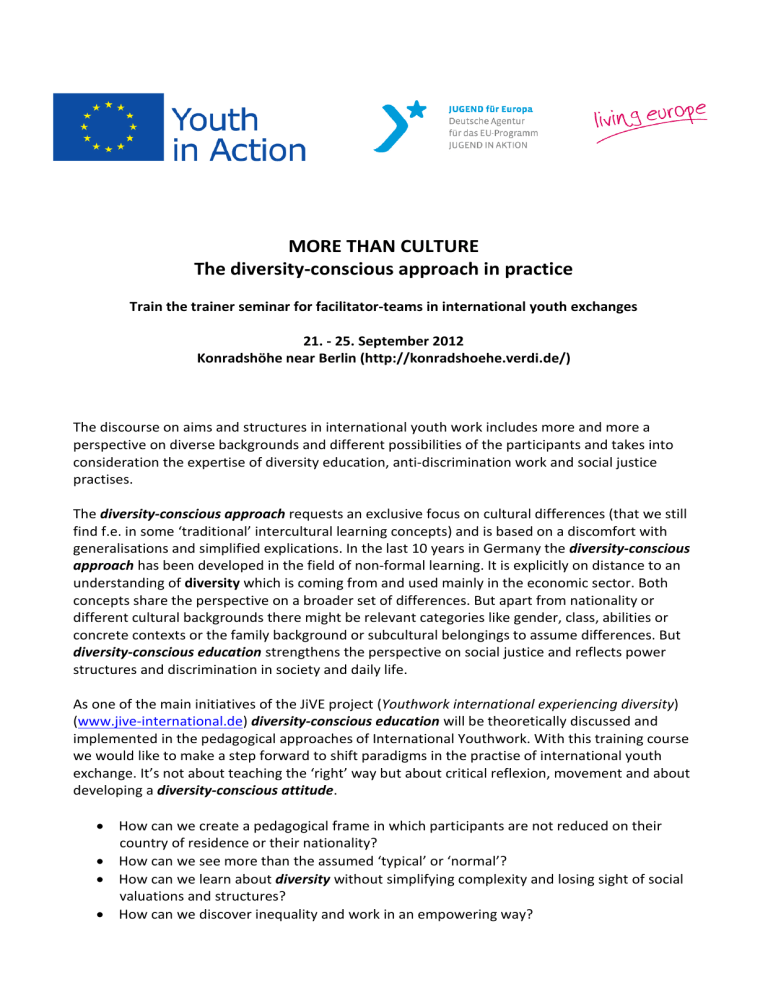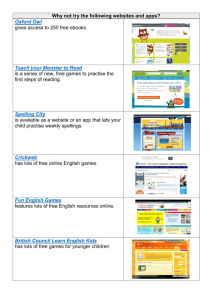MORE THAN CULTURE The diversity-conscious approach in practice

MORE THAN CULTURE
The diversity-conscious approach in practice
Train the trainer seminar for facilitator-teams in international youth exchanges
21. - 25. September 2012
Konradshöhe near Berlin (http://konradshoehe.verdi.de/)
The discourse on aims and structures in international youth work includes more and more a perspective on diverse backgrounds and different possibilities of the participants and takes into consideration the expertise of diversity education, anti-discrimination work and social justice practises.
The diversity-conscious approach requests an exclusive focus on cultural differences (that we still find f.e. in some ‘traditional’ intercultural learning concepts) and is based on a discomfort with generalisations and simplified explications. In the last 10 years in Germany the diversity-conscious approach has been developed in the field of non-formal learning. It is explicitly on distance to an understanding of diversity which is coming from and used mainly in the economic sector. Both concepts share the perspective on a broader set of differences. But apart from nationality or different cultural backgrounds there might be relevant categories like gender, class, abilities or concrete contexts or the family background or subcultural belongings to assume differences. But diversity-conscious education strengthens the perspective on social justice and reflects power structures and discrimination in society and daily life.
As one of the main initiatives of the JiVE project ( Youthwork international experiencing diversity )
( www.jive-international.de
) diversity-conscious education will be theoretically discussed and implemented in the pedagogical approaches of International Youthwork. With this training course we would like to make a step forward to shift paradigms in the practise of international youth exchange. It’s not about teaching the ‘right’ way but about critical reflexion, movement and about developing a diversity-conscious attitude .
How can we create a pedagogical frame in which participants are not reduced on their country of residence or their nationality?
How can we see more than the assumed ‘typical’ or ‘normal’?
How can we learn about diversity without simplifying complexity and losing sight of social valuations and structures?
How can we discover inequality and work in an empowering way?
Objectives for participants:
to learn what a diversity-conscious approach is about
to deepen the consciousness about our own belongings, power positions and experiences with diversity and discrimination in your international co-operation with your partner(s)
to experience and reflect a diversity-conscious attitude as facilitator
to experience concrete methods for international youth exchange and reflect, discuss and adapt them
to plan concrete steps to implement a diversity-conscious perspective in a concrete seminar and in their organisations
Fr 21.09.
Arrival
Activities:
Getting to know each other.
Sa 22.09.
Presentation programme
First step into the topic
Exercise 1
Evaluation
Evaluation out of the perspective as facilitators,: challenges and chances, adaption and new ideas…
Input
Su 23.09.
Exercise 3
Evaluation
Evaluation perspective facilitator (see above)
Input
Mo 24.09.
Tue 25.09.
A diversityconscious attitude!
What does it mean?
Steps for change: diversityconscious perspectives in international practise and discourse.
Small group work on specific topics and open questions from the participants.
Evaluation of the seminar.
Exercise 2
Evaluation
Evaluation perspective facilitator
(see above)
Input
Exercise 4
Evaluation
Evaluation perspective facilitator (see above)
Input
Free evening in
Berlin.
Action Planning in international teams.
Activity together.
Departure!
Target group:
The training course is designed for participants who are
able to motivate your international partners for common participation
Educators, youth workers or facilitators …
Experienced in facilitating international youth exchanges
Willing to reflect their educational practise and the dominant focus on cultural differences in youth exchanges
Interested in adapting a new perspective to their work
Teamwork:
If you are interested to participate ask your international partner to come with you!
We would like to invite teams of two partners who already worked together for an international youth exchange in the last years and who plan to continue a close partnership.
We will work in a group of 20 participants.
Because of the limitation of places, we ask you to apply with the attached application form.
Please send the application form until latest 30.07.2012. More information see there.
Your trainers:
Stephan Schwieren
Coordinator of international youth work, Haus am Maiberg,
Heppenheim, Germany s.schwieren@haus-ammaiberg.de
www.haus-am-maiberg.de
Ahmet Sinoplu Anne Sophie Winkelmann
Freelancer: International youth worker, racism awareness and violence prevention trainer,
Berlin, Germany
Freelancer: Facilitation of international youth exchange and further education, conceptual and theoretical work, Berlin, Germany weltenbummler.initiative@google mail.com
a.winkelmann@vervielfaeltigunge n.de
www.vervielfaeltigungen.de
This seminar is funded by the YOUTH IN ACTION programme.







